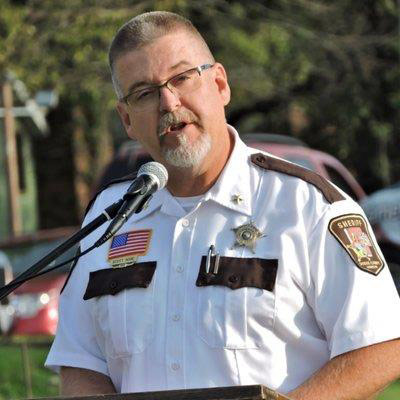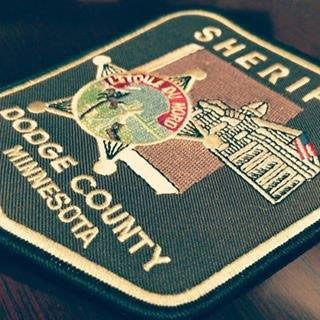Contact Us
To provide feedback on the Community Policing Dispatch, e-mail the editorial board at CPDispatch@usdoj.gov.
To obtain details on COPS Office programs, publications, and resources, contact the COPS Office Response Center at 800-421-6770 or AskCopsRC@usdoj.gov

U.S. Department of Justice
Office of Community Oriented Policing Services
Washington, DC 20530
 Scott Rose is the sheriff of Dodge County, Minnesota. Dodge County is part of the Rochester Metropolitan Area, and many county residents work at Rochester’s Mayo Clinic, a destination medical center.
Scott Rose is the sheriff of Dodge County, Minnesota. Dodge County is part of the Rochester Metropolitan Area, and many county residents work at Rochester’s Mayo Clinic, a destination medical center.
For us, community policing encompasses a mindset, in how we engage and interact with the public, and also a process for implementing policies, programs, and procedures to encourage community involvement and building relationships with the public we serve. In Dodge County (MN), the goal is to encourage buy-in from the community towards their own public safety—law enforcement and the community work together in partnership.
Engagement with communities
We have a number of departments in our agency that work with communities in different ways. For example, we contract with several cities within the county to provide law enforcement services, and the same deputies are assigned to city patrols to build trust with the communities over time. The deputies work there every night and that frequency helps them develop relationships with the citizens and businesses; the deputies get out of their squad cars to talk with residents and business owners. They attend council meetings and city meetings to engage the local residents. Feedback from the public is positive, and residents will request specific deputies respond for help with issues because of the relationships they have made and the rapport that has developed.
One of our most important pieces of community policing process is the school resource officer (SRO) program. Officers are assigned in all three school districts and work with students from kindergarten through high school. Especially with elementary and middle school, where kids are impressionable, it is so important for our officers to build rapport—build trust and relationships with the students. And not only with the students, but officers build relationships with parents and faculty over time. The SROs have people ask for them by name throughout their career, both when the students are in school and into adulthood, because of the relationships and rapport built early on with the parents and students. During summer breaks, the SROs do community outreach work over to improve rapport with the families. From a community standpoint, that is one of the most important positions in our office.
Another way we engage the public is through community outreach and training. Our deputies are at business expos, fairs, and city festivals with booths to talk about the services we provide. We conduct several TZD (Toward Zero Deaths) programs across the county, with increased patrol for distracted driving, and deputies present mock crash programs for all three high schools during prom and homecoming season. We also do National Night Out [an annual community-building campaign that promotes police-community partnerships] and conduct DARE for all the fifth grade students in the county.
After the church shooting in Texas last summer, we had churches reach out to us for help. We developed a training program for churches and about 35 attended the training. Deputies, emergency management, and I are now following up with site surveys to help them work with their safety programs, evaluate their property and services, and review their policies and procedures for working with the public and the congregation.
Dodge County has a very active drug court program for high-risk offenders as a response to the chemical dependency problems that are certainly not unique to our area. Sheriff’s office members are on the drug court committee staff that reviews prospective candidates and reviews their progress as participants. We also do ‘Knock and Chat,’ or we do house checks several times a week with drug court participants to develop a rapport and make sure they are in compliance with drug court rules. We help with intensive supervision of drug court clients during the 18-month program. We work well with all our public safety partners to support the community. Because we outreach and engage with the community to build rapport, when something big is going on or residents see something of concern, they know who to contact and trust our deputies.
Collaboration with peers
 One of the best practices I can recommend to other agencies is networking; we network with the other sheriff’s offices across the state. Minnesota has 87 counties and all the sheriffs are actively involved in the Minnesota Sheriffs Association (MSA), the state chapter of the National Sheriff’s Association. The MSA organizes training throughout the year; holds a winter and a summer conference; provides legal assistance and advice on administration and case law—and I rely on them for feedback. In addition to the state association, we also have regional associations. I am in the regional group 6 that represents southeast Minnesota, and we meet once a month to discuss various topics like policies and procedures, programming, social media, and public data requests.
One of the best practices I can recommend to other agencies is networking; we network with the other sheriff’s offices across the state. Minnesota has 87 counties and all the sheriffs are actively involved in the Minnesota Sheriffs Association (MSA), the state chapter of the National Sheriff’s Association. The MSA organizes training throughout the year; holds a winter and a summer conference; provides legal assistance and advice on administration and case law—and I rely on them for feedback. In addition to the state association, we also have regional associations. I am in the regional group 6 that represents southeast Minnesota, and we meet once a month to discuss various topics like policies and procedures, programming, social media, and public data requests.
The MSA also acts as a liaison with the state. In Minnesota, the position of sheriff is nonpartisan—our belief here is that politics and law enforcement shouldn’t go together. Law enforcement makes decisions based on what is best for the community.
Social media
Our county is very active on social media to outreach about our initiatives, programs, and successes. We are very proactive from a law enforcement standpoint, and social media is one way we engage with the public. We expect a 20 percent population increase by 2030 as a result of new employment opportunities in the Rochester metropolitan area and we use social media to encourage positive growth—we demonstrate that this is a great place to live and raise families. Conversely, social media also works to deter negative growth—to keep away people who may be interested in coming here for nefarious reasons.
My recommendation to law enforcement executives and future leaders is to get involved in state associations. In addition to networking, these association are where you get new ideas and get resources to help engage with your community. Daily workload can be overwhelming, but engagement with peers and community members helps to make your agency better.
Sheriff Scott Rose
Dodge County Sheriff Department
Subscribe to Email Updates
To sign up for monthly updates or to access your subscriber preferences, please enter your email address in the Subscribe box.






